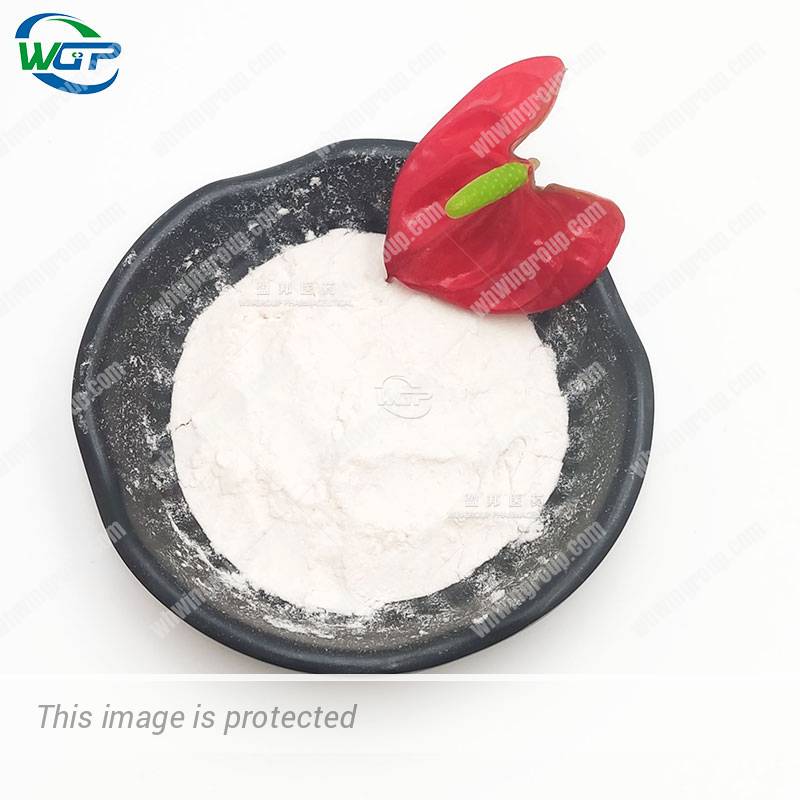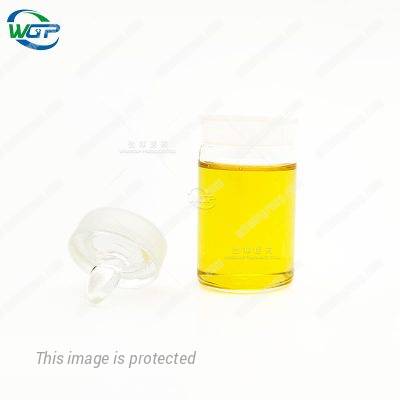Imidocarb Dipropionate
CAS:55750-06-6
MF:C22H26N6O3
Imidocarb dipropionate is a propionate salt of imidazobenzuron, a potent antiprotozoal agent. It is commonly used in animals like horses, where it is found to be effective in inhibiting the Theileria equi strains causing infections.
- Description
- Additional information
Description
Imidocarb Dipropionate CAS 55750-06-6 Product Information
| Product Name: | Imidocarb dipropionate |
| Synonyms: | IMidocarb dipropiona;N,N’-BIS[3-(4,5-DIHYDRO-1H-IMIDAZOL-2-YL)PHENYL]UREA DIPROPANOATE;LABOTEST-BB LT00053575;IMIDOCARB DIPROPIONATE;N,N’-bis(3-(4,5-dihydro-1H-imidazol-2-yl)-phenyl);N,N-bis(3-(4,5-dihydro-1H-imidazol-2-yl)phenyl)urea) dipropionate;Imidocarb dipropionate VETRANAL;1,3-Bis[m-(4,5-dihydro-1H-imidazol-2-yl)phenyl]urea dipropionate |
| CAS NO: | 55750-06-6 |
| Molecular Weight: | 422.49 |
| Molecular Formula: | C22H26N6O3 |
| solubility: | DMSO (Slightly, Heated), Methanol (Slightly) |
| Melting point: | 205 °C (dec.)(lit.) |
| storage temp: | Inert atmosphere,Room Temperature |
| Appearance: | White or off white crystalline powder |
imidocarb dipropionate dosage in dogs
The dosage of imidocarb dipropionate in dogs can vary depending on the specific condition being treated and the weight of the dog. It is important to consult with a veterinarian for the appropriate dosage and treatment regimen tailored to your dog’s individual needs. The following are general guidelines for imidocarb dipropionate dosage in dogs:
- Babesiosis Treatment:
- Initial Dose: 5 to 6.6 mg/kg (or 2.27 to 3 mg/lb) of body weight administered by deep intramuscular injection.
- Repeat Dose: A second dose is usually administered 14 days after the initial dose. The same dose as the initial dose may be given or adjusted based on the veterinarian’s recommendation.
- Canine Ehrlichiosis Prevention:
- Preventive Dose: 3.5 mg/kg (or 1.59 mg/lb) of body weight administered by deep intramuscular injection. This dose is typically given at intervals of 4 to 6 weeks, depending on the risk of exposure to ticks.
It’s crucial to note that these dosages are general guidelines and may vary based on the specific situation, the dog’s health condition, and the veterinarian’s recommendation. The dosage may also depend on the concentration and formulation of the specific imidocarb dipropionate product being used.
Always consult with a veterinarian to determine the appropriate dosage, treatment duration, and any additional instructions specific to your dog’s condition. They will consider factors such as your dog’s weight, overall health, and the severity of the infection or disease being treated. Following the veterinarian’s guidance will help ensure the safe and effective use of imidocarb dipropionate in your dog.
imidocarb dipropionate mechanism of action
The exact mechanism of action of imidocarb dipropionate is not fully understood, but it is believed to have multiple effects on various stages of the parasites it targets. Here are some proposed mechanisms of action:
Inhibition of DNA Synthesis: Imidocarb dipropionate is thought to interfere with the synthesis of DNA in the parasites. It may inhibit the activity of enzymes involved in DNA replication and repair, thereby disrupting the replication and survival of the parasites.
Disruption of Energy Metabolism: Imidocarb dipropionate may disrupt the energy metabolism of the parasites. It has been suggested to interfere with the mitochondrial electron transport chain and inhibit the production of adenosine triphosphate (ATP), which is essential for cellular energy.
Damage to Parasite Cell Membranes: Imidocarb dipropionate can cause damage to the cell membranes of the parasites. This disruption of the cell membrane integrity can lead to leakage of cellular contents and ultimately the death of the parasites.
Immunomodulatory Effects: Imidocarb dipropionate is believed to have immunomodulatory effects by stimulating the immune response. It may enhance the host’s immune system, which can contribute to the elimination of the parasites.
It’s important to note that while these mechanisms of action are proposed, the exact details of how imidocarb dipropionate affects specific parasites may vary. Additionally, imidocarb dipropionate is primarily used in veterinary medicine, and its use and mechanism of action may differ between different parasite species and host organisms.
As always, it is crucial to consult a veterinarian or a healthcare professional for detailed information and guidance on the specific mechanism of action and usage of imidocarb dipropionate for the intended application.
imidocarb dipropionate uses
Imidocarb dipropionate is a medication used primarily in veterinary medicine. It is an antiprotozoal and antihelminthic agent that is effective against certain parasites. Here are the main uses of imidocarb dipropionate:
- Treatment of Babesiosis: Imidocarb dipropionate is commonly used for the treatment of babesiosis in animals. Babesiosis is a tick-borne disease caused by the protozoan parasite Babesia, which infects red blood cells. Imidocarb dipropionate helps to eliminate the parasites from the bloodstream and control the infection.
- Treatment of Cytauxzoonosis: Cytauxzoonosis is another tick-borne disease seen primarily in cats. It is caused by the protozoan parasite Cytauxzoon felis, which infects red blood cells and can be fatal. Imidocarb dipropionate may be used as part of the treatment protocol for cytauxzoonosis in cats.
- Prevention of Canine Ehrlichiosis: Imidocarb dipropionate can be used as a preventive measure against canine ehrlichiosis, a tick-borne disease caused by the bacteria Ehrlichia canis. It helps to reduce the risk of infection in dogs that are at high risk or reside in endemic areas.
- Treatment of Certain Helminthic Infections: Imidocarb dipropionate has also shown effectiveness against certain helminthic infections, specifically those caused by certain species of worms, such as Hepatozoon spp. and Dipetalonema reconditum.
Additional information
| Weight | 1 kg |
|---|---|
| Melting Point | 205 °C (dec.)(lit.) |
| Color | White |
| Form | Powder |








Reviews
There are no reviews yet.